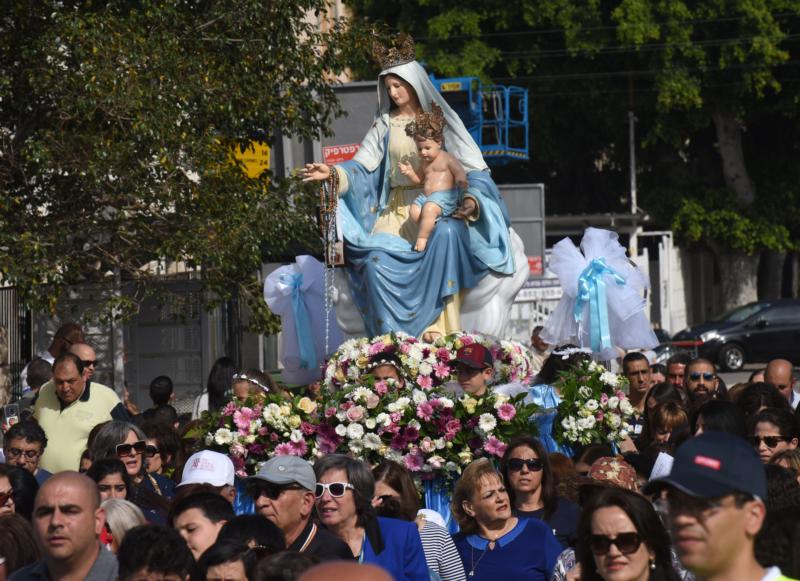
The statue of Our Lady of Carmel and the Christ Child are seen during a procession outside the Church of St. Joseph in Haifa, Israel, May 5, 2019. Devotion to Mary under this title connects Catholics to their Jewish roots while deepening faith in modern and tumultuous times, said Father Matthew Guckin, pastor of Our Lady of Mount Carmel Parish in Doylestown. (CNS photo/Debbie Hill)
Devotion to Our Lady of Mount Carmel can help counter today’s “false gods and prophets,” while deepening awareness of Christianity’s roots in Judaism, said a Bucks County priest.
July 16 marks the feast of Our Lady of Mount Carmel, an optional memorial in the liturgical year with roots stretching back to the prophet Elijah.
In preparation, Father Matthew Guckin, pastor of Our Lady of Mount Carmel in Doylestown, has been leading parishioners in a novena to their Marian patroness, which will culminate with a feast day Mass at their church celebrated by Archbishop Nelson Pérez.
The liturgy will cap what has been a week of reflection and discovery for parishioners, said Father Guckin.
“People have been saying to me they’ve never learned so much about Our Lady of Mount Carmel,” he said.
Like many Marian titles — such as Lourdes, Fatima and Knock — the name Carmel is a geographic one, referencing Har Ha-karmel, a mountain ridge in Israel near the city of Haifa and revered since ancient times as a holy place. Archaeologists have found evidence of prehistoric settlements on Carmel, while Egyptian records from the 16th century B.C. mention the site.
In the First Book of Kings, Elijah famously contends with the prophets of Baal on the mountain, ultimately proving the superiority of Israel’s God over their idol (1 Kgs 18:1-46).
[hotblock]
Around the time of the Third Crusade (1189-1192), a group of European pilgrims settled on Carmel as hermits, following the example of Elijah and developing a profound devotion to Mary. Approved by Pope Innocent IV in the mid-13th century, the “Brothers of St. Mary of Mount Carmel” were forced to relinquish their mountain abode under pressure from Muslim opponents.
Returning to Europe, the religious founded monasteries for both men and women known as “Carmels.” Among the most well-known Carmelites are St. Teresa of Avila, St. John of the Cross, St. Thérèse of Lisiuex and St. Simon Stock, the order’s sixth general, to whom Mary is said to have revealed the congregation’s iconic brown scapular in the 13th century.
The devotion’s promise – that those who die wearing the scapular will be granted final perseverance and entry to heaven – shouldn’t turn the humble woolen sacramental into a “religious rabbit’s foot,” cautioned Father Guckin.

Father Matt Guckin, pastor of Our Lady of Mount Carmel in Doylestown. (Sarah Webb)
“The original scapular was cut from the habit of St. Simon Stock,” he said. “And as the word ‘habit’ implies, it reminds us of the importance of developing faith, hope, love, prudence, justice, temperance, fortitude – those habits of life which keep us in a state of grace that gains as entry to eternal life.”
Those virtues are diametrically opposed to the values that tend to be exalted in the culture today, he said.
Wealth, power and pleasure seemingly point “the way to happiness and peace,” said Father Guckin, but that “very seductive message” is not “one that has a future.”
If anything, the quest for worldly success – combined with the turmoil of the pandemic and widespread social unrest – has left many in a state of anxiety, he said.
For that reason, he composed a “Litany of Peace” specifically for the “very relevant” Carmel novena.
“It was a moment of grace,” said Father Guckin. “I spent a few hours going through all of the things that cause me stress and anxiety, and I made a litany of them.”
Given the positive response to the litany, he added, “clearly these are the things that are also causing others stress and anxiety.”
Along with the litany, the nightly novena prayers have included Marian hymns, antiphonally recited psalms and Scripture readings “all foreshadowing Our Lady,” he said.
Among the passages have been Genesis 3:15 (known as the protoevangelium, or “first Gospel”), in which God promises a redeemer for fallen mankind, and verses relating to the ark of the covenant, considered a type of Mary.
The Old Testament Scriptures underscore that “Jews and Catholics are joined at the hip, morally, ritualistically, spiritually,” said Father Guckin. “Our Lord was Jewish, Mary was Jewish, Elijah was Jewish – there’s a wealth of connections to be made. In fact, a fuller understanding of the Scriptures, and in particular the Gospels, comes to us when we understand our Jewish roots.”
The Carmel devotion’s long reach through time – from Elijah to Mary, with a focus on eternity — can provide grounding in a troubled present, he said.
“The past year has taken a toll on our hearts, our homes, our world,” said Father Guckin. “Our intention is to have peace in our hearts, leading to peace in our homes, outpouring into peace in our world.”
***
Below is the text of “The Litany of Peace” and “Peace Prayer” written by Father Matthew Guckin for the July 16, 2021 observance of the feast of Our Lady of Mount Carmel.
The Litany of Peace
(By Father Matthew Guckin)
From the desire to control … Deliver me, Lord Jesus.
From the desire to give my opinion … Deliver me, Lord Jesus.
From the desire to project myself as a victim … Deliver me, Lord Jesus.
From the desire to impress others … Deliver me, Lord Jesus.
From the desire to please everyone … Deliver me, Lord Jesus.
From the tendency to complain … Deliver me, Lord Jesus.
From all my irrational fears … Deliver me, Lord Jesus.
From all violent speech … Deliver me, Lord Jesus.
From failing to accept uncertainty … Deliver me, Lord Jesus.
From comparing myself to others … Deliver me, Lord Jesus.
From not accepting my limitations … Deliver me, Lord Jesus.
From an unhealthy desire for perfection … Deliver me, Lord Jesus.
From an unhealthy attachment to others … Deliver me, Lord Jesus.
From excessive self-blame … Deliver me, Lord Jesus.
From holding on to grudges … Deliver me, Lord Jesus.
From holding on to the past … Deliver me, Lord Jesus.
From wanting more than I need … Deliver me, Lord Jesus.
From the impulse to justify myself … Deliver me, Lord Jesus.
From worrying about the future … Deliver me, Lord Jesus.
From thinking only about myself … Deliver me, Lord Jesus.
From losing perspective on life … Deliver me, Lord Jesus.
From not being able to laugh at myself … Deliver me, Lord Jesus.
From not being able to forgive myself … Deliver me, Lord Jesus.
From over analyzing the intentions of others … Deliver me, Lord Jesus.
From the desire to change others … Deliver me, Lord Jesus.
From thoughts that this world is all there is … Deliver me, Lord Jesus.
From failing to trust in God … Deliver me, Lord Jesus.
From failing to see God in all things … Deliver me, Lord Jesus.
Peace Prayer
God of peace, calm me and heal me. Let your peace reign in my heart at this very moment and for all eternity. We make our prayer in the Name of Jesus Christ, the Prince of Peace. Amen.
PREVIOUS: Mass obligation reinstated as of Aug. 15, Archbishop Pérez says
NEXT: Prayer, conversion, good works needed to win ‘freedom for the pre-born’


Share this story